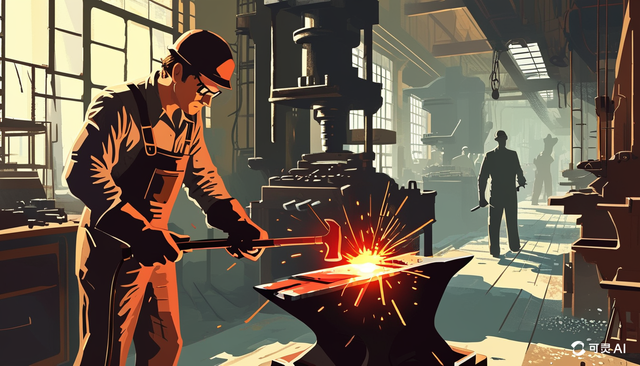
接着讲一讲父亲年轻时的经历。上次说到父亲作为知青,初中还没毕业就被下放到蕲春的农村。不过在那里待了一年多就回到了武汉,在武汉长江大桥当了一段时间的护桥工。
因为长江大桥属于铁路系统管理,70年代铁路系统在武汉建立了车辆配件厂。父亲就在当时进厂当了一名工人,工种是锻工,就是用气锤将烧红的铁加工成零件形状,这也就是他职业生涯的起点了。从那以后一直都在这个岗位上工作。
我现在仍然不曾忘记,小时候在厂区中玩耍的模糊记忆,以及父亲提到的当年同事。模糊的印象里有一个父亲的同事比较清楚,因为他的长相酷似《西游记》中孙悟空的饰演者六小龄童,所以父亲他们都叫他外号"猴子"。
印象中到了后来,父亲工作的这家配件厂效益不好,也搞起了承包。这个外号叫"猴子"的同事是有些能力的,承包了他们班组。但父亲谈起他时还是带着些不屑,因为和他们不一样,"猴子"不是知青出身,而是当时街上的个体户,他们家的职业就是背着风箱,在大街小巷吆喝,替人们打菜刀打斧头。我对父亲说:"这也算劳动阶级、无产阶级吧?”“那怎么算呢?他们这是有家当的。建厂的时候他是自告奋勇,说自己会打铁才被招进来的。"
其实在70年代,文革还未结束的时候,还是有体制内体制外的差别的。因为国有企业是体制内的,那些背着风箱走街串巷打铁的,自然是体制之外,就是早期的个体户,还是被认为是走资本主义道路的象征。被父亲提到他的出身时,多少还是带着嫌弃的口气。且在那个强调阶级论的年代,这样的个体户小工出身还不是最差。父亲提到厂里也有一些类似"黑五类"出身的人,平时会受到更多的打压,只能低头做人。
父亲工作的这座车辆配件厂是完全的计划经济体制。进入改革开放后到90年代,我上小学初中的时候,就已经从父母那里感觉到工厂的效益已经不行了,因为完全不适应市场经济。随着后来铁路电气化发展,其产品也完全没有销路和应用的地方,也没能实现转型。不过好在铁路系统算是国家非常重视的战略行业,在效益下滑、经过承包折腾了一段时间之后,在90年代末21世纪初办理了内退,享受了铁路系统还不错的退休福利待遇,比当时的下岗职工的境遇要好不少。
okKOlet's go.接着讲一讲父亲年轻时的经历。上次说到父亲作为知青,初中还没毕业,就被下放到蕲春的农村。不过在那里待了一年多就回到了武汉,在武汉长江大桥当了一段时间的富桥工。因为长江大桥属于铁路系统管理就70年代,铁路系统在武汉建立车辆配件厂。复京就在当时进厂当了一名工人工总。是断工,就是用气锤将烧红的铁加工成主要的零件形状,这也就是他职业生涯的经历了。从那以后还一直都是在这个岗位上工作,就是自我现在仍然不鲜,小时候的模糊记忆,在厂区中玩耍的模糊记忆,父亲聊了一下当年的同事模糊的印象里有一个父亲的同事比较清楚。因为他的长相波似西游记中,孙悟空的饰演者六小。名童,所以父亲他们都叫他的外号叫做猴子。印象中到了后来父亲工作的这些配件厂效益不好,也搞起了承包。这个外号叫猴子的同事是有些能力的,讲他们班组承包了下来。我父亲讲了他是还是其中有些不屑。认为他们父亲不一样,不是知心出身,而是当时铁的个体户,他们家的职业就是被这个风。大街小巷的吆喝,替人们打菜刀打斧头,说这也算劳动阶级、无产阶级吧。父亲说那怎么算呢?他们这是有家当的,但是建场的时候招工是自告奋勇,说自己会打铁才被招进来的。其实在70年代,文革还未结束的时候,还是有体制内体制外的差别的。因为就是国有企业是体制类的了。那些背着风箱走街串巷打铁的,自然是。之外,就是早期的个体户,还是被认为是走资本主义道路的象征。被父亲提到他的出生时,多少还是代谢不懈的口气。且在那个强调,阶级论不生论的年代,这样的小个出身还不是最差。父亲提到有些因为里也有一些类似黑五类出身的人,平时会受到更多的打压,只能自头做人。附亲工作的这辆这座车辆配件厂是计划经完全是计划经济的厂。进入改革开放之后,而90年代,我上小学初中的时候就已经就已经从父母的那种感觉到工厂的效益已经不行了,因为完全不适应。随着后来铁路电气化进展,其产品也完全没有销路和应用的地方,也没能实现转型。不过好在铁路系统算是国家非常重视战略行业,在效益消化,要经过承包折腾了一段时间之后,在90年代末。21系初办理了内退享车了,如系统还不错的退休福利待遇比当时的下岗职工是境遇要好不少。
Then I will tell you about my father's experience when he was young. Last time I talked about my father as an educated youth, he was sent to the countryside in Qichun before he graduated from junior high school. However, after staying there for more than a year, he returned to Wuhan and worked as a bridge guard on the Wuhan Yangtze River Bridge for a while.
Because the Yangtze River Bridge is managed by the railway system, the railway system established a vehicle parts factory in Wuhan in the 1970s. At that time, my father joined the factory as a worker, the work is a gas hammer to red iron into the shape of parts, this is the beginning of his career. I have been working in this position ever since.
I still have not forgotten the vague memories of playing in the factory when I was a child, and the colleagues mentioned by my father. I have a vague impression that one of my father's colleagues is more clear, because he looks like Liu Xiao Tong, who plays Sun Wukong in Journey to the West, so they all call him "Monkey".
Later, in my impression, the benefits of the parts factory where my father worked were not good, and he also contracted. The colleague nicknamed "Monkey" is some ability, contracted their team. But my father still talked about him with some disdain, because unlike them, "monkey" was not an educated youth, but a self-employed person in the street at that time, and their family's occupation was to carry a bellows, shout in the streets, and beat kitchen knives and axes for people. I said to my father, "Is this the working class, the proletariat?" "How do you calculate that? They have a family here. When the factory was built, he volunteered, saying that he could blacksmith and was recruited."
In fact, in the 1970s, before the end of the Cultural Revolution, there were still differences within and outside the system. Because state-owned enterprises are within the system, those who carry bellows from street to street to work iron are naturally outside the system, which is the early self-employed, or considered to be a symbol of the capitalist road. When his father mentioned his origin, he was more or less disgusted. And in that era of class theory, such self-employed workers were not the worst. Father mentioned that there are also some similar "black five" people in the factory, usually will be more suppressed, can only bow to life.
The car parts factory where my father worked had a completely planned economy. After the reform and opening up, in the 1990s, when I was in primary and junior high school, I already felt from my parents that the benefits of factories were no longer viable, because they were completely unsuitable for the market economy. With the later development of railway electrification, its products have no sales and applications, and it has not been able to achieve transformation. However, fortunately, the railway system is a strategic industry that the country attaches great importance to, after a period of decline in efficiency and contracting, it was handled in the late 1990s and early 21st century, and enjoyed the retirement benefits of the railway system, which was much better than the situation of laid-off workers at that time.
Upvoted! Thank you for supporting witness @jswit.
Downvoting a post can decrease pending rewards and make it less visible. Common reasons:
Submit